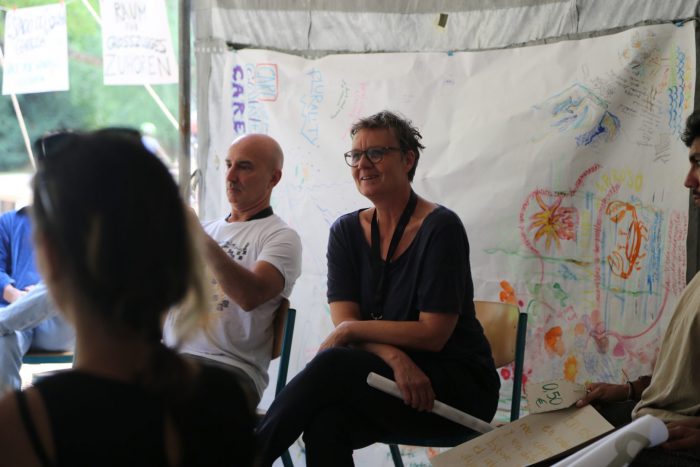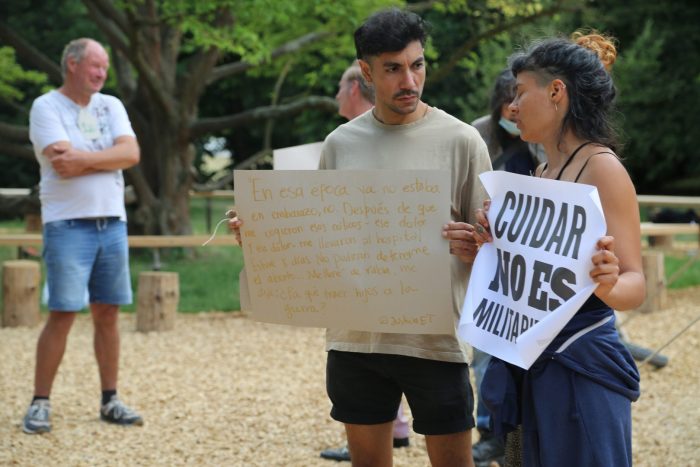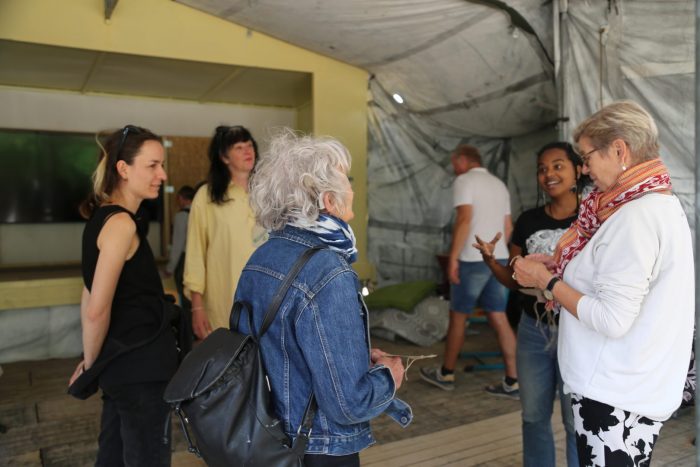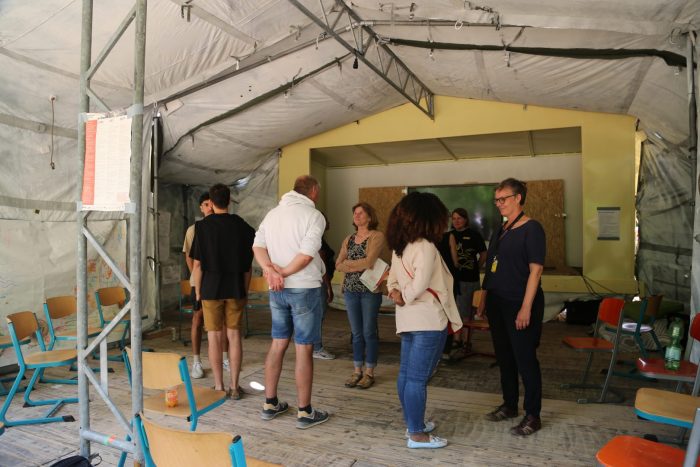Atrato [Collaborations] Unlikely Encounters
Atrato [Collaborations] Unlikely Encounters
About Atrato Collaborations
Atrato Collaborations (2018 – 2020) facilitated exchanges between cultural managers and artists from Colombia, Switzerland and Germany. In Colombia it was aimed specifically at participants from Quibdó, Chocó, whose practice related to the Atrato River as a ‘subject of biocultural rights’. Participants from Switzerland and Germany were interested in the idea of collaborations between practices and contexts that are far apart but could meet -improbably- to generate alliances that inspire each other and seek common actions.
#AtratoCollaborations – A project by Más Arte Más Acción in the framework of the programme “COINCIDENCIA” cultural exchanges Switzerland – South America of the Swiss Foundation for Culture Pro Helvetia.
#Coincidence_Prohelvetia #Coincidence_Colombia
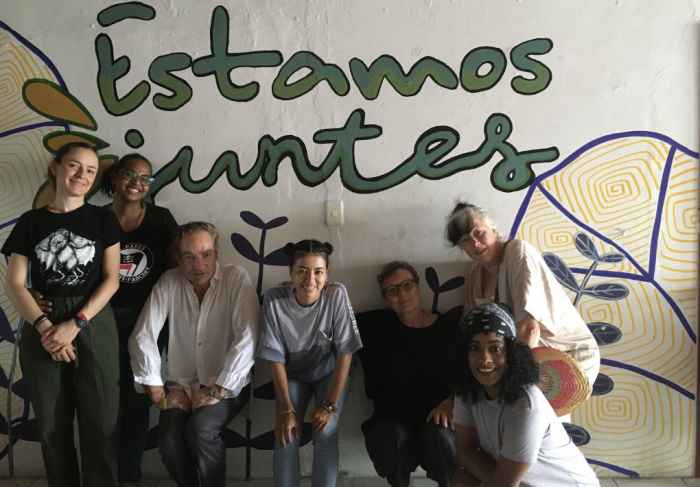
About Lxs Atratxs – the collective of artists and collaborators from Switzerland and Germany
Ariane Andereggen, Ted Gaier and Kathrin Wildner have been working in performative activism to reveal the dark system of the commodity trade value chain in which Switzerland plays a central role as a tax haven. They have been very active in the Swiss Coalition for Corporate Justice.
After their first trip to Quibdó, they were motivated to continue collaborations through their artistic practices, first they had the idea to collaborate with the Atrato Fest, but the pandemic stopped that plan. Their performative, corporal and musical practices are only viable for collaboration through physical encounters. They joined forces with two colleagues from Germany and the cultural networks of Germany and Switzerland, and the four organisations (Más Arte Más Acción, Corporaloteca, Fundación Mareia and Motete) travelled on an adventure that resulted in spaces of coexistence and encounter between organisations that did not work together in Colombia at that time due to political differences, but the invitation was fulfilled.
In 2021 the pandemic was controlled with the vaccination plan and other measures, so theatres reopened in Germany and Switzerland. A 1-month trip was organised for 8 people to share Atrato Collaborations there.
“As I did not travel to Chocó in 2019, the meeting with German Summer 2021 was my first time here. I was curious and enthusiastic, with Petra Barz from Dock Europe we planned a programme for the stay in Hamburg. The idea of this self-organised trip was to share our daily life in Hamburg with the Chocó sisters, to get to know and network with local anti-racist, feminists and Right to the City initiatives. The programme was very dense, sometimes too dense, everyday life was hidden behind the organisational structures. But we still did some walks around the city, we had dinners and parties that we cooked together. I wonder how they perceive the city. As I tried to answer the questions, why nobody is on the streets, why everybody seems so invested, why there is no happiness on the faces…. I imagined that they explained or even justified the “German behaviour” with the cold climate, the individualism ….. what? that makes no sense…..
Listening to their lives, the workload, the political and economic problems, the violence and personal threats each of the Chocó women faced, I was irritated by the intensity of the fun, listening to the music …. as the crazy happiness sings to the song about the river being so polluted” Pescao envenenao”.
Kathrin Wildner, urban anthropologist
“Unlikely Encounters”, written by Ariane Andereggen y Ted Gaier
Unlikely Encounters aims to open, rather than close something. It is only a working title, which can be many things. We (Ariane Andereggen / Ted Gaier / Christian Hübler / Yvonne Wilhelm) have chosen this scenario because we don’t want or can’t identify a ‘project’, but want to create a basis for developing ideas together, on equal terms.
This scenario, this title, is like a blank space, something inexplicable. What is it that makes an encounter improbable, perhaps the moment when empathy emerges beyond hegemonic boundaries? After all, borders are constructed in such a way that such encounters and empathies do not occur, if they are even possible at all, and if at all, only in figures of institutionalised and hierarchical thinking from “NGOs” or so-called “development aid”.
So this may also be an attempt to approach the concept of solidarity beyond power relations. But improbability can also mean simply the reception we experience in Quibdó, in the midst of the disasters that the North causes in the South.
That capitalism and its postcolonial effects are problematic is usually clear. But the question is whether our critical and artistic understanding in the global North is compatible with the political art criticism and/or artistic activism of artists in the global South. So on what basis of solidarity can a meeting, an exchange, a cooperation be credible? What forms of working together and experiences exist here that make sense? Do we have something like a common “enemy” or is it simply a matter of devotion to a common political or aesthetic conviction?
Or none of the above?
Journey diary of Mareia, Wontanara, Motete and La corporaloteca to Switzerland and Germany, written by Carmenza Rojas
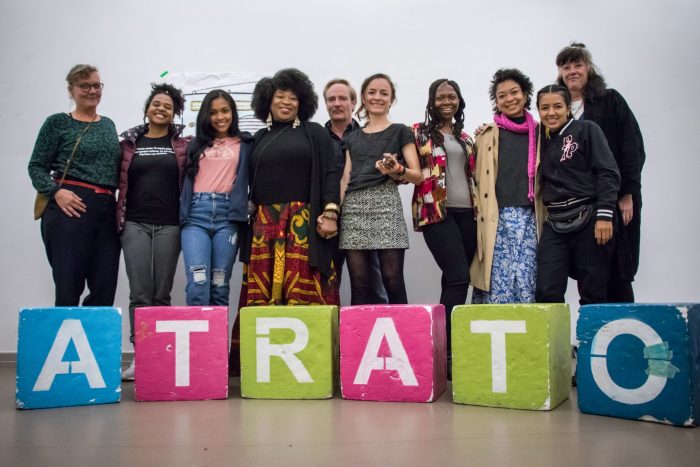
You may be wondering what all these women are doing together in Germany for so long?
Well, here we present the first stop of this journey through Switzerland and Germany and the entanglements that we have been developing as part of the closing of the Atrato Collaborations project, after 3 years of actions between Motete, Fundación Mareia and Corporaloteca with different organisations, in exchange trips. This journey was organised by Ariane Andereggen and Ted Gaier, the artists who weave a web between Switzerland and Germany, as well as their friends Christoph Twickel, Kathrin Wildner and Petra Barz, who gave strength to the design of a flexible agenda of exchanges of knowledge on issues related to our cultural practices and diverse political interests.
The journey began with a quarantine in Dock Europe, a cultural and educational space that receives people from cultural processes and activists. We were there without the presence of Velia Vidal who was at the International Book Fair in Madrid. We start to organise our approach and begin to work on the creation of a performance, then with the arrival of Velia the group is completed, the connections begin and the creation of the performance stops. The integrations begin at the hosts’ house with a delicious meal that invites us to experience the flavours of Europe and to dance to the rhythm of Colombia.
We toured feminist and environmental projects, walked along the Billie River and got to know the talent of Ariane Andereggen, who presents “The Age on Stage”, her autobiographical work that narrates her artistic practices in correspondence with her being and the relationship between the commercialism of herself, all framed in the tensions between these relationships.
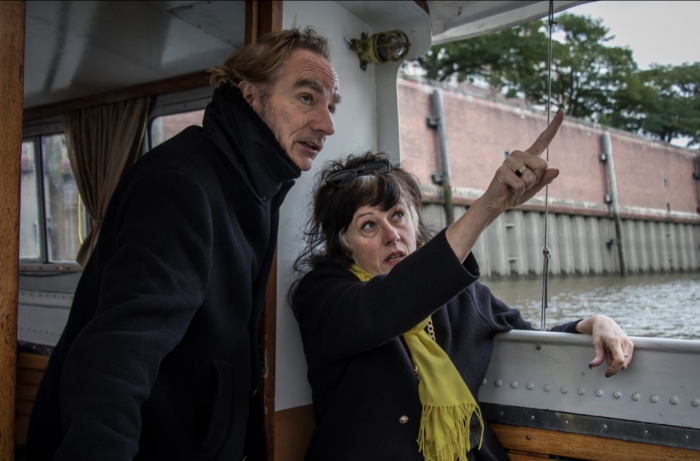
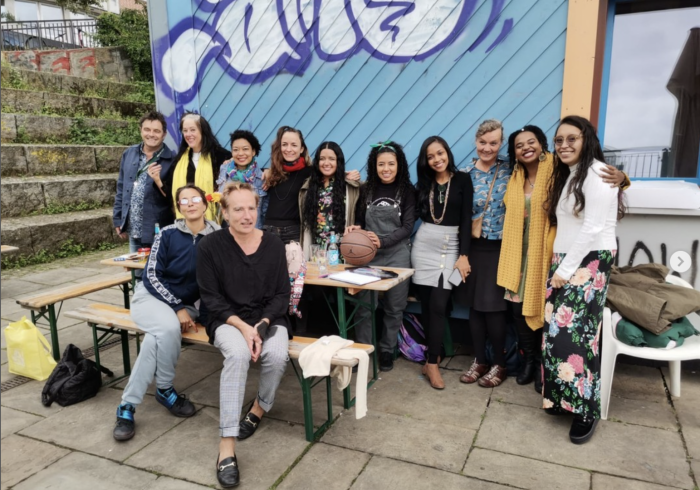
In addition, the story of the conquest of the rights of the city by Ted’s allied groups was told through the ongoing story of the Park Fiction Movie, led by Christoph Schafer and the great Margaret, mother of Ted Gaier, who together with the squatters’ movement of the 1980s created the methodology of wish production, a participatory design bid to secure the right to the city and stop the construction of a power plant. They dreamt up palm trees, slides and common spaces where dreams are still being produced, which, like now, are woven with our own. In addition, the port of Hamburg allowed with its huge ships and containers to create a dystopian image of what is planned for our Chocó and to reaffirm #NotoTribugáPort.
Ted was invited by the Forum Freies Theatre (FFT) to curate the works of the art festival on the Right to the City and the Okupa movement. This festival takes place in the framework of “Place”, a project of artistic, urban and activist practices combining the memory of the past and the imagination of future uprisings inspired by the 73 days of the Paris commune or the waves of revolution.
In this programme, the #AtratoCollaboration group presented their performance and organised a cultural peña for the debut of the #AtratoAllStars. After a week of intense practices, the particular knowledge of each organisation was put into dialogue, in which the Atrato River was a medium for dialogue on colonial and extractivist models, and above all on the diverse narratives shared by the arts as an axis of action-creation. We closed with a conversation where we exposed different points of view and ended with a performance by Dj Puka and Christoph Twickel.
We did three performances, finding narratives in a mixture of seriousness with humour and irony allowed us to talk about the right of the Atrato river as a biocultural subject, the rights of the black communities of the Pacific and the diverse actions with which each organisation (Motete, Mareia, Corporaloteca, MAMA) has interacted during the time of the project. Being able to chat with Tobias that little while and that he was also present at the Basel performance was very valuable, I know that it is a sui generis project and we recognise the institutional generosity that they have had with this experiment.
Finally, it’s important to say that this trip also included the meeting with Alexander in the Museum of Anthropology in Basel, which was very important, because during the exhibition in Kassel – in Documenta – we will do a seminar on extractivism together with Liliana Gómez from the University of Kassel, who is also the curator of the exhibition Extractive Zones. The performance “Altamira 2042” by Gabriela Carneiro da Cunha was an UNFORGETTABLE performance experience for the group, a great opportunity (how can we bring it to Colombia?! hehe).
The music accompanied the trip and the performance was the common challenge that weaved singularities that were reinforced on the return trip to Quibdó in February 2022. During 20 days between Bogotá and Quibdó, Ted Gaier, Ariane Andereggen and Kathrin Wildner (Lxs Atratxs) visited and met Wontanara (a project with which they will continue to develop particular collaborations), created a performance with Kelly Zapata and Bambazú, while Paula OG, created a series of videos and photographs, to continue developing artistic residencies. They also met with MAMA in Quibdó and discussed possible collaborations for documenta fifteen and anti-Semitic awareness.
In February 2022 the return trip took place with a visit to Casa Wontanara, the exhibition on the armed conflict in Quibdó “ExpoRenacientes” and the performance “What does white mean?” on the Malecón, as well as participating in the 5th birthday of Motete. The trip ended in Bogotá at the home of MAMA, where the importance of this project, the collaboration with Prohelvetia and the possible union for Documenta quince with CAPAZ and the Truth Commission were discussed.
“When I was in Quibdó, Chocó, for the first time in February 2022, I imagined that these contradictions were everywhere, that they looked like a pardo, but it was everyday life. The abundance of nature, the scarcity of things, the heavy rains, the scarcity of water ….
I looked at the huge trees, like a dense unit of many intertwined plants. I cannot detect where one plant ends and the next begins. I cannot “read” nature, not even the urban environment, there are different rules, markers and the meaning of tradition, it seems very important to manifest or invent one’s own tradition and history at the same time looking for possible transformations, ways to transform tradition as the musicians of the Corporaloteca asked us to do.
I try to accept or understand the dense simultaneity and the many contradictions; and I have to admit how difficult it is for me just to look, without having a formula to analyse or explain.
I try to listen, I want to listen more. Like in the conversations in the Wontanara House, everyone talks and listens, sharing experiences, pains and desires; a very important way of caring and healing!”
Kathrin Wildner, urban anthropologist
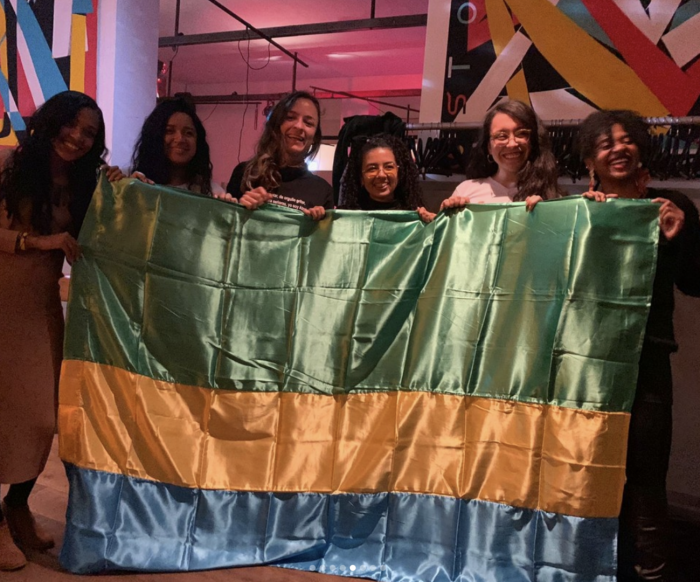
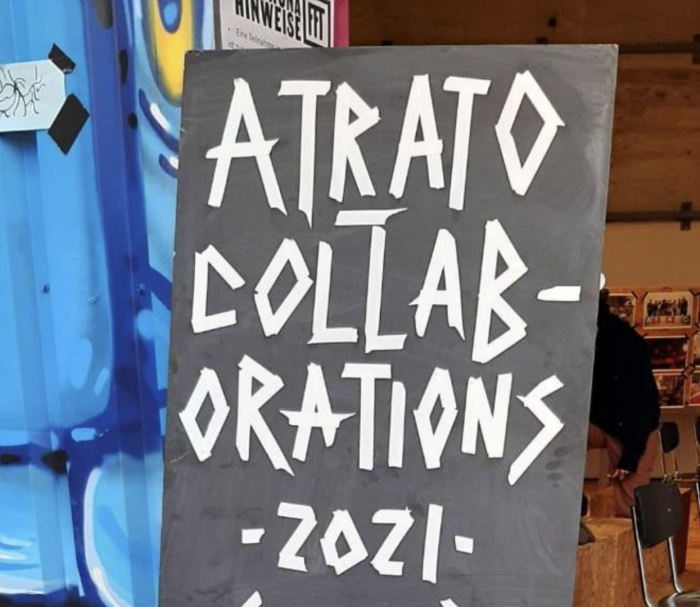
Memories of MAMA in documenta written by Rossana Alarcón
At the invitation of Ariane Andereggen, Ted Gaier, Kathrin Wildner of the collective Lxs Atratxs and Carmenza Rojas, the participants of the performance laboratory VERDADES, we reflected on the processes of truth and memory in Colombia through questioning the value of human life.
Each of the participants put a price on their lives by delving into the value of life through the reading and exposition of victims’ testimonies of the Colombian conflict. We shared personal experiences that prompted the choice of these values – and reflections that these testimonial fragments left us with – about the violence and the diversity of contexts we face.
In the following days, the “truth hostesses” expanded their reflections on the violence in Colombia, the Peace Process and the role of the Truth Commission with German and international audiences who attended the conversation spaces. We were especially grateful to the Corporaloteca and the Exporenacientes exhibition for lending us the posters that were part of the performance, and to the Instituto Colombo Alemán Para la Paz (CAPAZ) for making this space possible.
